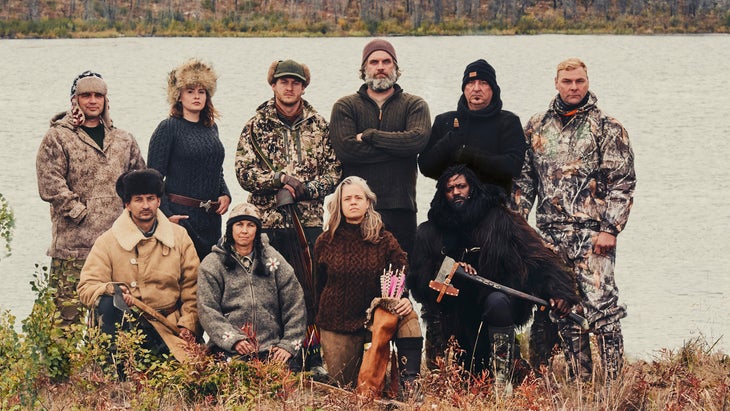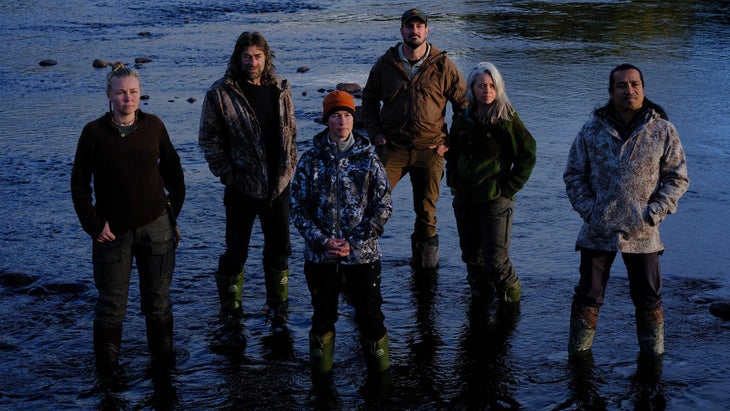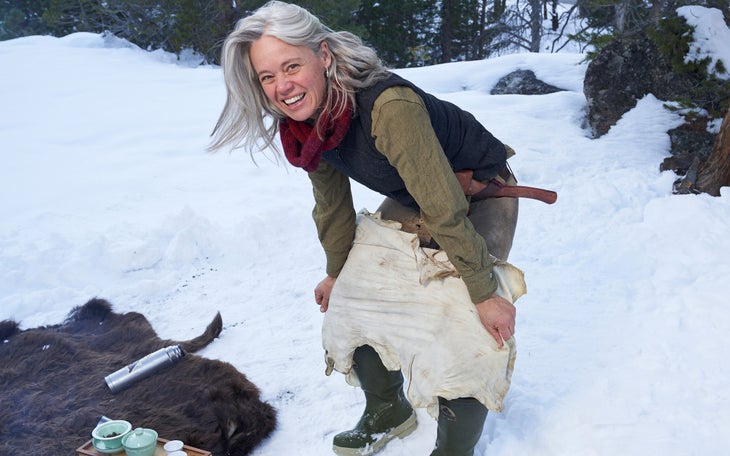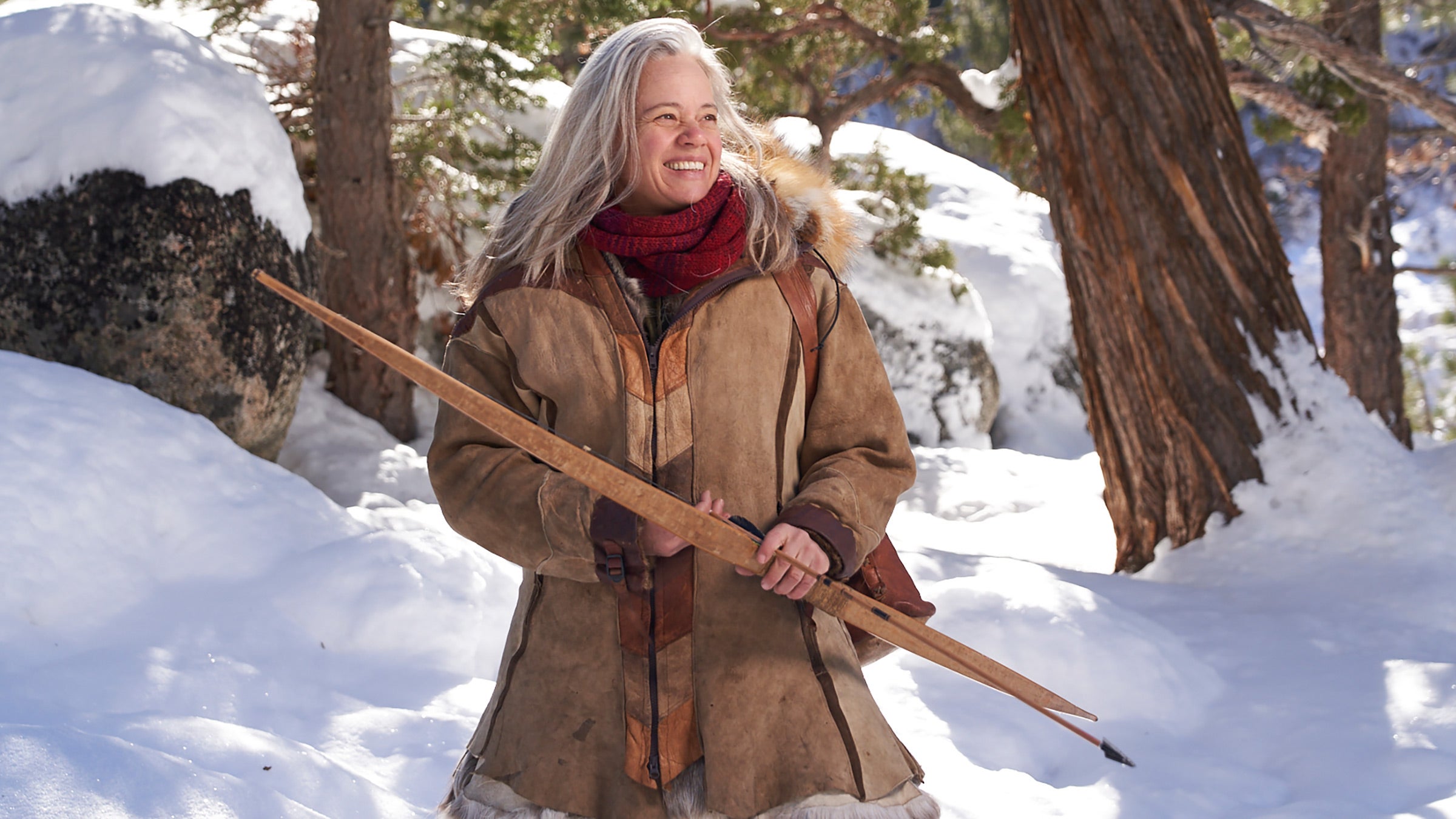I watch Alone differently than others.
My lavish snacks aren’t unique—everyone knows nothing builds an appetite like watching other people starve. For most viewers, the hunger is psychological. For me it’s a visceral memory.
I rarely watched television before being recruited for the show back in 2018, but now I never miss an episode of Alone. Each one brings me right back to the places my own two seasons as a cast member took place, the shores of Great Slave Lake and the rugged coast of Labrador.
My two Alone journeys were vastly different. In Season 6, set at Canada’s Great Slave Lake, I loved every day so much I was certain I would never tap, but did. On Alone Frozen, held in 2021 in Labrador, I thought about tapping every day, but didn’t. Together, both experiences give me a unique Alone-watching superpower: I can generally spot a tap out before it happens, and often before the participant knows it themselves.
Why? Because, while it is extremely physically challenging, Alone is 90 percent mental.
When the Mind Wants to Quit, the Body Will Follow
I’ve seen the same dynamic play out thus far on Season 12. This season of Alone is taking place in South Africa’s Great Karoo Desert, as opposed to a cold climate, and the warm and dry conditions bring unique challenges and sets this season apart.
The pattern holds true, however, that most people tap out mentally well before they reach their physical limit. From the point when they quit in their minds, no matter if it takes days or hours, they are just waiting for the justification to act on it. When I watch the show, I read the clues of the participants’ mental state in their posture, voice, decision-making, self-talk and more.

Days 1-10 are the first threshold. You’d think that with everyone full of excitement, energy, and calorie reserves, this period would be the easiest. Not so. Going from socialized, well-fed, and comfortable, to total isolation and little to no food can be brutal, and the transition can blindside people. Just the inevitable shift to ketosis—a physical state in which your body runs on fat instead of blood sugar—can cause headaches, fatigue, nausea, digestive issues, and other symptoms that can masquerade as more serious illnesses. Extreme discomfort is inevitable out there. Finding mental comfort within the physical discomfort, while also recognizing and avoiding the real physical dangers, is essential.
People adjust, and life in the wilderness gets a bit easier after a week or so, but in early episodes I can often see the participants’ fear that things won’t improve. It comes across in the slump of their shoulders and the sense of defeat in their voice.
The body and mind are incredibly connected. When the mind dwells on leaving, the body is often happy to deliver an excuse—an injury from a stumble, an accident with a knife or axe, you name it. The suffering mind can even cause heart palpitations, digestive problems, or other physical issues. Likewise, a strong mind can overcome dire physical circumstances.
If You Want to Stay, Your Body Will Find Ways to Survive
On Season 6, I was slowly starving to death, but I was so in love with the experience and the pristine wilderness of Great Slave Lake, that I felt not only strong, but joyous, even as my body began digesting my own muscles.
In contrast, my first week on Alone Frozen was gruelingly difficult. A storm hit before my permanent shelter was finished, and I spent days drenched and hypothermic. I longed constantly for my cozy fireplace and my sweet partner back home.

I carried on.
Without enough trees to build with, I dug my shelter into the thin soil and hauled rocks and sod for the bulk of my walls. Between that and prying mussels off rocks under the frigid sea water, I developed wrist tendonitis so extreme that I could hardly turn my headlamp on.
I could still haul rocks though.
I carried on.
Days later, I woke up in the night with shooting pain in my toe, dreaming that someone was trying to cut it off. In the morning, I found a huge, green, pus-filled blister on the nail bed. I could barely put weight on it and was almost comically crippled with my hooked hands and heavy limp.
“Okay body,” I said, “I see what you’re doing. You’re providing excuses to give up and go home. I’m sorry I gave the impression I wanted that.”
I hobbled on, but promised myself that if I remained this miserable for three more days, I would consider tapping.
In the middle of the following night, I scrambled out of bed to go outside to pee.
I heard the hiss before I sensed the burning. The safety on my pepper spray had been pulled out by wading through spruce thickets and my fumbling had pushed the trigger. I’d just doused my sleeping bag, my rain jacket, and my fur parka with pepper spray.
But as the pain subsided and my eyes and nose stopped flowing like a faucet, I rocked back on my heels and laughed.
At that moment, I knew I could win Alone Frozen, if I wanted to. The environment was brutally challenging. My body had given me every justification to tap, then pepper spray on top of that, but I didn’t want to go.
I had won the mental game, and now I just needed to carry on and not screw up until the timeline played out.
Signs That a Participant Is About to Tap Out
Having been to the very brink of the mental tap out then back again, here are some of the things I look for to indicate if participants are still in the game.
How do they handle adversity?
The locations of Alone and the survival circumstances are always incredibly challenging. You must expect little failures, but focus on the positive and celebrate every small victory. “Hey,” I’d tell myself each day I went without food during Season 6, “look how much time I’m saving by not cooking!” Fixating on the hardship instead of the beauty will take you out.
Are they curious about and engaged with the place, or are they looking at their photo and talking about home and family?
Staying long-term demands connecting with the environment, learning its patterns, and adapting to them. You must really be there, body, mind, and spirit. Alone producers allow participants to bring one photo with them, and I think this is a booby trap. Dwelling on thoughts of home invites reasons for heading back there.
Are they becoming careless with essential gear?
When your life depends on the ten survival items you bring into the wilderness, you must take extreme care with them. Not doing so can provide a quick and easy excuse to go home.
Are they thinking critically and planning for weeks or months ahead?
Making poor choices like building a shelter inadequate for the harsher weather that is inevitably coming is, consciously or subconsciously, choosing a short-term stay.
Are they bettering their situation every day, or merely enduring their suffering until it overwhelms them?
Hopelessness and helplessness are not long-term strategies on Alone. You must believe it can be better, then make it true.
Ultimately, everyone chooses their own unique Alone journey. I don’t believe participants must push themselves to the very brink of survival to succeed. Deciding to leave Season 6 before being medically evacuated remains one of the most important and proudest moments of my life.
While billed as a competition, Alone is really a journey of personal discovery—an initiation of body and soul. It is as humbling or as empowering as we let it be.
Each participant finds what they need to out there, and in their own time. But I always wish a long stay for everyone. There is a huge gift in surrendering to the experience, letting it push us beyond our pre-conceived ideas of self, and finding the strength and resilience on the other side.

was the first woman to win Alone, and between her two seasons, holds the record for the most cumulative days on the show. An author, educator, and speaker, she chronicled her time on Alone Season 6 in her memoir, . She teaches ancestral, wilderness, and survival skills and offers consultation for Alone hopefuls, writers, and filmmakers. Learn more at www.woniyathibeault.com or join her on Patreon for exclusive content and early access to her writing and classes.


